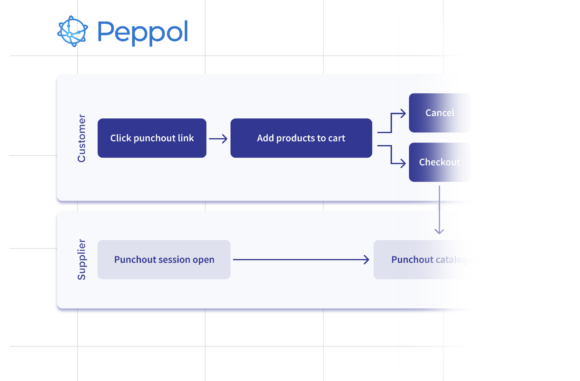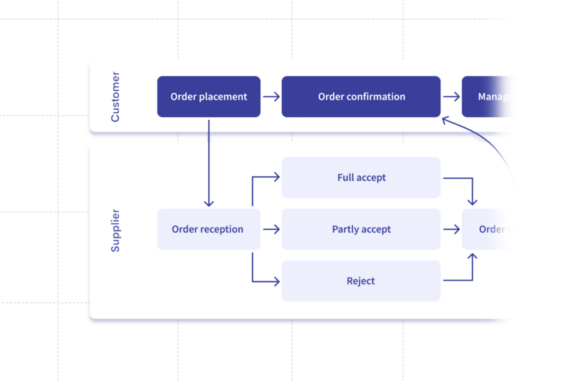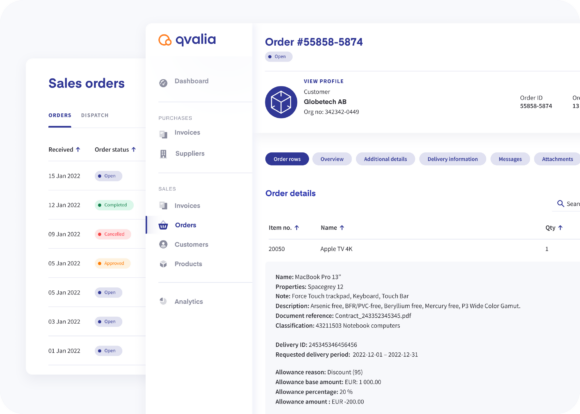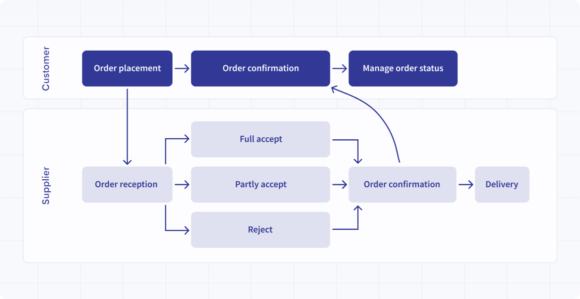Transactions, technologies and trends
Category: E-order management
E-orders, short for “electronic orders,” refer to the digitization and automation of the order management process in various industries. In traditional business operations, orders were often communicated through manual paperwork or phone calls, leading to potential errors, delays, and inefficiencies. E-orders revolutionize this process by leveraging electronic platforms and technologies to enhance accuracy, speed, and overall productivity.
Through e-ordering systems, businesses can electronically submit, process, and track orders in real-time. This eliminates the need for physical paperwork and reduces the likelihood of miscommunication, resulting in fewer errors and faster order fulfillment. E-orders can be initiated by customers, distributors, or partners through networks such as Peppol, via web portals, mobile apps, or integrated systems, making the ordering process more convenient and accessible.
Key benefits of adopting e-orders include:
Accuracy: Electronic systems reduce the risk of manual data entry errors, ensuring that the order details are accurately captured and transmitted.
Efficiency: E-Orders streamline the entire ordering workflow, reducing the time and effort required to process orders, generate invoices, and manage inventory.
Real-time Tracking: Both buyers and sellers can track the status of orders in real-time, providing transparency and allowing for proactive problem-solving.
Inventory Management: E-Orders often integrate with inventory management systems, enabling businesses to maintain optimal stock levels and minimize overstock or understock situations.
Cost Savings: The reduction in paperwork and manual processing can lead to significant cost savings in terms of paper, printing, and labor.
Enhanced Customer Experience: Faster order processing and accurate deliveries contribute to improved customer satisfaction and loyalty.
Data Insights: E-Order systems can generate valuable data insights, helping businesses identify trends, customer preferences, and areas for operational improvement.
As businesses continue to embrace digital transformation, e-orders play a pivotal role in modernizing and optimizing the order placement process. By automating and centralizing order management, organizations can enhance their competitiveness, improve customer relationships, and drive growth in the dynamic landscape of the digital age.
Explore our content on e-order management.

One particularly compelling feature within the Peppol framework is punchout, a combination of process and business messages. It simplifies B2B procurement and B2B e-commerce by allowing buyers to access suppliers’ websites directly from their procurement system, creating a seamless shopping experience.

Punchout technology has the potential to radically increase efficiencies in sales, purchase, and procurement processes for business-to-business transactions. Here’s how to use punchout technologies in B2B procurement.

Peppol is an international business network that enables companies to exchange electronic invoices, purchase orders, and other documents. It works perfectly for electronic order management.

E-order management is the process of electronically managing orders, from the initial placement to the final delivery and invoicing. The use of Peppol e-order management can significantly improve transaction processes for both buyers and sellers.

A successful B2B e-commerce merchant heavily depends on the provided experience. The service catering to the needs of business customers is crucial; level of …
